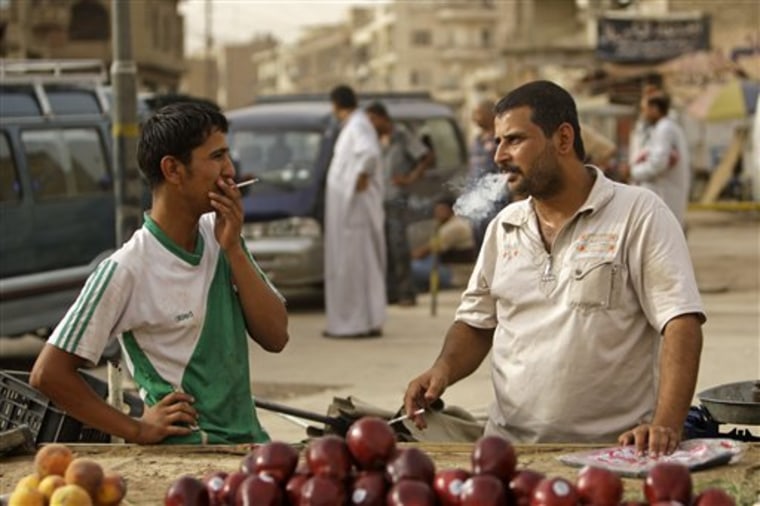The Iraqi Cabinet has approved a draft bill to stamp out smoking in public places, the first such bill in a country where lighting up is virtually a rite of passage for most young men, a government spokesman said Thursday.
The law aims to curb the number of people who start smoking and raise awareness about the dangers of cigarettes, said spokesman Ali al-Dabbagh. The bill still needs to be approved by parliament, which is in recess until September.
If passed, the Iraqi law would be one of the region's most comprehensive bans, similar to many laws in the U.S. and Europe.
Smoking is common in many Arab countries, where a pack of cigarettes can cost less than 50 cents. Though there have been modest efforts to curb smoking, there are few comprehensive restrictions on where smokers can light up.
The Egyptian parliament passed a law in 2007 banning tobacco advertising and smoking in some public places, including government buildings, schools and hospitals. The Syrian government imposed a smoking ban over a year ago in ministries and other public buildings, though people can light up in private rooms.
Banning sale to minors, smoking in public
The Iraqi law would make smoking illegal in public places, such as government buildings, schools, movie theaters, sports facilities and on public transportation. It also bans the sale of cigarettes to anyone under the age of 18.
The media would be banned from advertising cigarettes, and organizations that violate the ban would be fined up to 5 million dinars (nearly $4,300). The same fine would be levied against those who import, produce or sell tobacco products that have more than a specified amount of nicotine or tar.
Those who smuggle tobacco into the country would face fines up to 10 million dinars (nearly $9,000).
The draft law does not make clear what punishment those who smoke in public places will face.
Al-Dabbagh said the law also would require cigarette companies to put warning labels on packages.
"The Ministry of Health will take over the responsibility of coordinating with other ministries and educational institutions as well as administering programs that will raise awareness of smoking and its dangers," al-Dabbagh said in a written statement.
Critics: Smoking should be low priority
Baghdad resident Mohammed Hussein, 45, said he considers a smoking law to be the least pressing law that parliament should consider.
"The smoking law is not as important as many other laws with a higher priority for Iraqis," said Hussein, who works at the oil ministry and said he smoked for 25 years before quitting.
Cigarettes are so inexpensive in Iraq "that even a poor boy can buy them," Hussein said.
Najim Aboud, 17, who works at a cafe serving shisha, or water pipes, in eastern Baghdad said the law would hurt his income.
"I left school and was forced to worked at a shop that serves water pipes to make money and help my family. This law will have a bad effect on me and many other teenagers who work in this field," Aboud said.
Legislation in line with WHO
The Iraqi Cabinet undertook the smoking ban after parliament in 2008 ratified the World Health Organization Framework Convention on Tobacco Control, which requires governments to develop a comprehensive tobacco control program. The health ministry took steps shortly thereafter to ban smoking in its buildings as well as establishing education programs in schools.
Al-Qaida in Iraq established radical Islamic laws in some parts of Iraq, which included a ban on smoking. Violators were punished with an amputation of a finger or hand.
